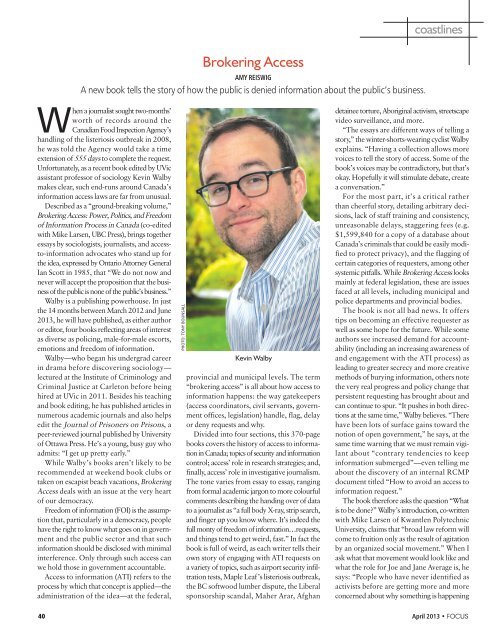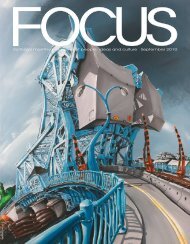You also want an ePaper? Increase the reach of your titles
YUMPU automatically turns print PDFs into web optimized ePapers that Google loves.
Brokering AccessAMY REISWIGA new book tells the story of how the public is denied information about the public’s business.coastlinesWhen a journalist sought two-months’worth of records around theCanadian Food Inspection Agency’shandling of the listeriosis outbreak in 2008,he was told the Agency would take a timeextension of 555 days to complete the request.Unfortunately, as a recent book edited by UVicassistant professor of sociology Kevin Walbymakes clear, such end-runs around Canada’sinformation access laws are far from unusual.Described as a “ground-breaking volume,”Brokering Access: Power, Politics, and Freedomof Information Process in Canada (co-editedwith Mike Larsen, UBC Press), brings togetheressays by sociologists, journalists, and accessto-informationadvocates who stand up forthe idea, expressed by Ontario Attorney GeneralIan Scott in 1985, that “We do not now andnever will accept the proposition that the businessof the public is none of the public’s business.”Walby is a publishing powerhouse. In justthe 14 months between March 2012 and June2013, he will have published, as either authoror editor, four books reflecting areas of interestas diverse as policing, male-for-male escorts,emotions and freedom of information.Walby—who began his undergrad careerin drama before discovering sociology—lectured at the Institute of Criminology andCriminal Justice at Carleton before beinghired at UVic in 2011. Besides his teachingand book editing, he has published articles innumerous academic journals and also helpsedit the Journal of Prisoners on Prisons, apeer-reviewed journal published by Universityof Ottawa Press. He’s a young, busy guy whoadmits: “I get up pretty early.”While Walby’s books aren’t likely to berecommended at weekend book clubs ortaken on escapist beach vacations, BrokeringAccess deals with an issue at the very heartof our democracy.Freedom of information (FOI) is the assumptionthat, particularly in a democracy, peoplehave the right to know what goes on in governmentand the public sector and that suchinformation should be disclosed with minimalinterference. Only through such access canwe hold those in government accountable.Access to information (ATI) refers to theprocess by which that concept is applied—theadministration of the idea—at the federal,PHOTO: TONY BOUNSALLKevin Walbyprovincial and municipal levels. The term“brokering access” is all about how access toinformation happens: the way gatekeepers(access coordinators, civil servants, governmentoffices, legislation) handle, flag, delayor deny requests and why.Divided into four sections, this 370-pagebooks covers the history of access to informationin Canada; topics of security and informationcontrol; access’ role in research strategies; and,finally, access’ role in investigative journalism.The tone varies from essay to essay, rangingfrom formal academic jargon to more colourfulcomments describing the handing over of datato a journalist as “a full body X-ray, strip search,and finger up you know where. It’s indeed thefull monty of freedom of information…requests,and things tend to get weird, fast.” In fact thebook is full of weird, as each writer tells theirown story of engaging with ATI requests ona variety of topics, such as airport security infiltrationtests, Maple Leaf’s listeriosis outbreak,the BC softwood lumber dispute, the Liberalsponsorship scandal, Maher Arar, Afghandetainee torture, Aboriginal activism, streetscapevideo surveillance, and more.“The essays are different ways of telling astory,” the winter-shorts-wearing cyclist Walbyexplains. “Having a collection allows morevoices to tell the story of access. Some of thebook’s voices may be contradictory, but that’sokay. Hopefully it will stimulate debate, createa conversation.”For the most part, it’s a critical ratherthan cheerful story, detailing arbitrary decisions,lack of staff training and consistency,unreasonable delays, staggering fees (e.g.$1,599,840 for a copy of a database aboutCanada’s criminals that could be easily modifiedto protect privacy), and the flagging ofcertain categories of requesters, among othersystemic pitfalls. While Brokering Access looksmainly at federal legislation, these are issuesfaced at all levels, including municipal andpolice departments and provincial bodies.The book is not all bad news. It offerstips on becoming an effective requester aswell as some hope for the future. While someauthors see increased demand for accountability(including an increasing awareness ofand engagement with the ATI process) asleading to greater secrecy and more creativemethods of burying information, others notethe very real progress and policy change thatpersistent requesting has brought about andcan continue to spur. “It pushes in both directionsat the same time,” Walby believes. “Therehave been lots of surface gains toward thenotion of open government,” he says, at thesame time warning that we must remain vigilantabout “contrary tendencies to keepinformation submerged”—even telling meabout the discovery of an internal RCMPdocument titled “How to avoid an access toinformation request.”The book therefore asks the question “Whatis to be done?” Walby’s introduction, co-writtenwith Mike Larsen of Kwantlen PolytechnicUniversity, claims that “broad law reform willcome to fruition only as the result of agitationby an organized social movement.” When Iask what that movement would look like andwhat the role for Joe and Jane Average is, hesays: “People who have never identified asactivists before are getting more and moreconcerned about why something is happening40 April 2013 • FOCUS
















